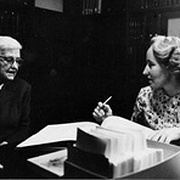Lily Ross Taylor (1886–1969)
Author of Party Politics in the Age of Caesar
About the Author
Image credit: Lily Ross Taylor (left) and Beryl Rawson by Peter Dechert. From the Bryn Mawr College Archives. http://www.brynmawr.edu/classics/history/RossTaylor.html
Works by Lily Ross Taylor
Tagged
Common Knowledge
- Birthdate
- 1886-08-12
- Date of death
- 1969-11-18
- Gender
- female
- Nationality
- USA
- Birthplace
- Auburn, Alabama, USA
- Place of death
- Bryn Mawr, Pennsylvania, USA
- Education
- Bryn Mawr College (PhD, 1912)
University of Wisconsin-Madison - Occupations
- classical scholar
professor
author
ancient historian - Organizations
- American Philological Association (president, 1942)
Institute for Advanced Study
Bryn Mawr College - Awards and honors
- Fellow of the American Academy in Rome (1920)
American Academy in Rome (fellow, 1920)
American Academy of Arts and Sciences (fellow, 1951) - Short biography
- Lily Ross Taylor was born in Auburn, Alabama. She developed an interest in ancient Roman history as an undergraduate at the University of Wisconsin-Madison. She went to Bryn Mawr College as a graduate student, earning her Ph.D. in Latin in 1912. In 1917, she became only the fourth female Fellow of the American Academy in Rome. After teaching at Vassar College for 15 years, she joined the faculty at Bryn Mawr as a professor of Latin and rose to be chairman of the department, and then dean of the graduate school in 1942. That same year, she served as president of the American Philological Association. During World War II, she served as the principal social science analyst in the Office of Strategic Services (OSS), the precursor of the CIA. After retiring from Bryn Mawr in 1952, she remained active as professor-in-charge of the Classical School of the American Academy in Rome and as a member at the Institute for Advanced Study in Princeton, New Jersey. Among her acclaimed works was Party Politics in the Age of Caesar (1949).
Members
Reviews
Awards
You May Also Like
Statistics
- Works
- 7
- Members
- 277
- Popularity
- #83,813
- Rating
- 3.9
- Reviews
- 4
- ISBNs
- 14
- Languages
- 1












"Cicero, confident in the support of senate and knights, had the execution carried out."
"Although the good men, following Catulus, hailed Cicero as the father of his country, the real hero of the famous Nones of December was not Cicero but Cato."
Perhaps this worked when these pieces were delivered as lectures? Perhaps classicists in the forties and fifties just wrote like this? In any case, while reading this I happened to read a review of new classics books by the wonderful Peter Thonnemann. He cautioned us not to idealize the scholarship of the past, before it got all trendy. For example, one "cutting edge" volume of this time period featured nine chapters on individual poets, and one on Roman and Greek historians. Back then, classics was just the classic books. Taylor's book is okay, but very much a period piece.… (more)